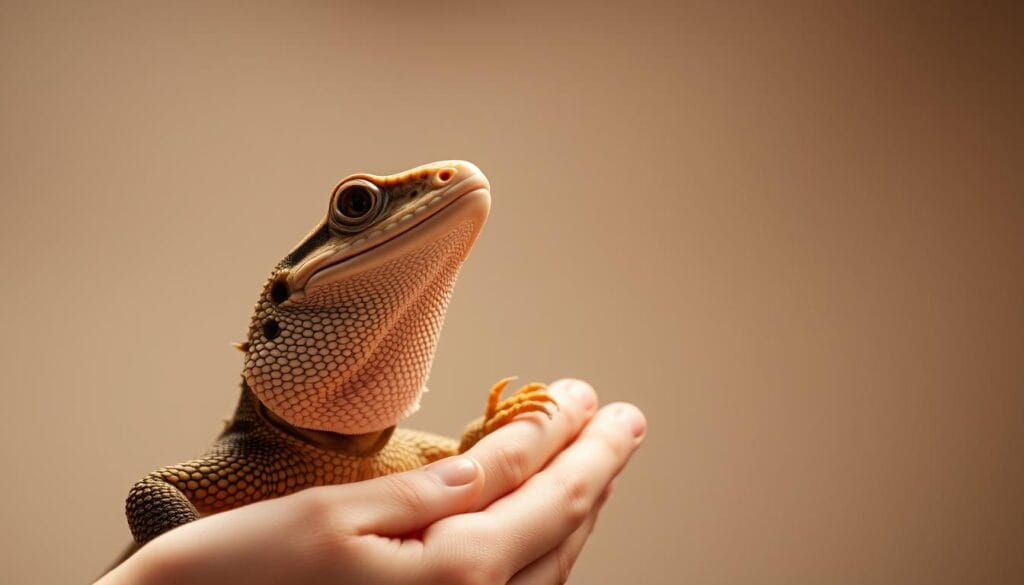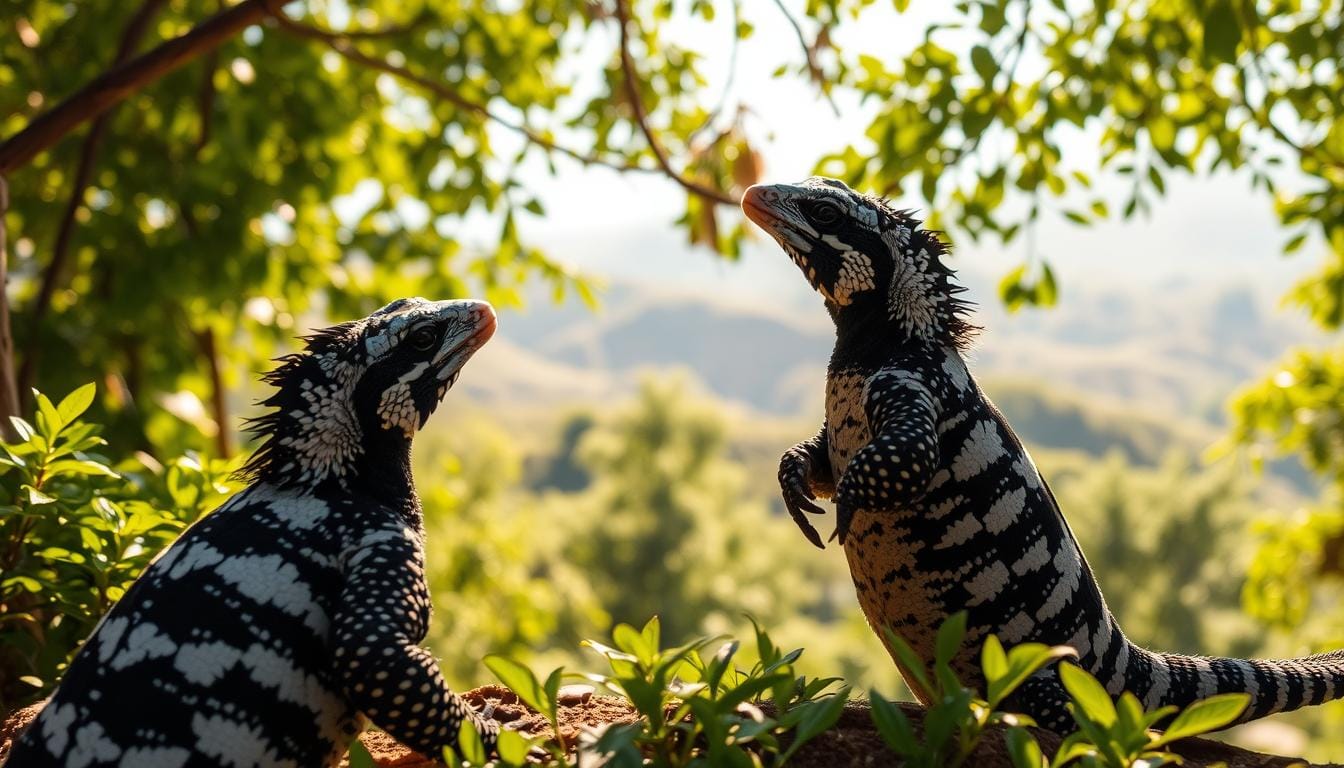Exploring tegu socialization is an exciting adventure. It’s about connecting with one of the smartest reptile species. The Argentine black and white tegu is a great choice for those who love reptiles and are ready to put in the effort to build a strong bond.
These lizards come from South America. They can grow up to 4-5 feet long and live 15-20 years in captivity. This guide helps turn these wild animals into pets that know and interact with their owners.
It’s important to know the differences between Colombian tegus and Argentine black and white tegus. Each type has its own personality and behavior. You need to use the right approach to handle and interact with them.
Table of Contents
Understanding Tegu Behavior
Tegus are fascinating reptiles with complex social structures and unique behaviors. Their behavior makes them stand out from many other reptiles. This is why they are so popular among reptile lovers. They are intelligent and adapt well to both wild and captive environments.
Exploring tegu temperament shows a world of instincts and social interactions. Tegus are active during the day. Their curiosity leads them to explore and interact with their surroundings in surprising ways.
Natural Instincts of Tegus
Understanding tegu instincts is key to knowing their behavior. These reptiles have several important traits:
- Highly intelligent and capable of problem-solving
- Opportunistic feeders with diverse dietary preferences
- Strong territorial instincts
- Capable of recognizing and responding to human interactions
Social Structures in Tegu Communities
In their natural habitats, tegus show complex social behaviors. They communicate through body language, vocalizations, and scent marking. Their behavior reveals a complex social hierarchy and interaction system.
Their adaptability allows them to thrive in different environments. This shows their incredible learning and social integration abilities. By understanding these aspects of tegu temperament, you can connect more deeply with your reptilian friend.
The Importance of Socialization
Socializing your tegu is key to a strong bond. Tegus need special ways to trust and feel safe with their owners. Learning how to bond with your tegu can make your relationship much deeper.
Good socialization brings many benefits for both you and your tegu. It can make your pet’s life better and more interactive.
Benefits of a Well-Socialized Tegu
- Reduced stress levels for the reptile
- Increased tolerance for handling
- Enhanced ability to explore new environments
- Improved communication between owner and pet
Tegus are special because they can interact with others. Argentine black and white tegus can grow up to 3 feet long and live 15 to 20 years. Their smart nature makes them stand out.
Signs of a Socialized Tegu
- Calm demeanor during handling
- Willingness to approach you voluntarily
- Relaxed body language
- Minimal defensive behaviors
Building a strong bond with your tegu takes time and patience. Regular interaction and positive feedback help them trust humans. Spending time on socialization will create a special bond with your tegu.
Preparing for Socialization
Starting with the right environment is key for your Tegu’s happiness. A safe and comfy space is vital for handling and bonding with your reptile.
Your Tegu’s home is very important for socializing. Adult tegus need big spaces that feel like their natural home. A good setup should have lots of room for them to move and explore. It should be at least 6x3x3 feet big.
Creating a Safe Habitat
Think about these important things when setting up your Tegu’s home:
- Temperature range of 75-85°F with basking spots up to 100-110°F
- Humidity levels between 60-80%
- Many hiding spots and places for fun
- Substrate that lets them burrow naturally
Essential Tegu Handling Tools
Having the right tools is crucial for safe and effective Tegu socialization. Make sure to get these:
- Thick protective gloves
- Feeding tongs
- Soft-bristled brushes for gentle touch
- Treat pouch for rewards
“A well-prepared environment is the foundation of successful Tegu socialization”
Remember, tegus can grow up to 4-5 feet long and live 15-20 years. So, your initial setup is a big investment in a long-term friend. With careful planning, you can build a strong and loving bond with your amazing reptile pet.
Starting the Socialization Process
Tegu taming needs patience, understanding, and a smart plan. Your reptile friend must learn to trust and feel safe with people. The early steps are key to a strong bond with your tegu.
Good tegu handling starts with a calm, predictable space. Tegus are smart and like gentle, regular interactions. Begin with a routine to make your pet feel safe and know what to expect.
Initial Handling Techniques
Here are the first steps in tegu taming:
- Move slowly and calmly around your tegu
- Use smooth, careful movements
- Begin with short handling times
- Always hold your tegu’s body right
- Look for signs of stress or discomfort
Gradual Introduction to New People
Introducing your tegu to new people needs a careful plan. Controlled exposure helps your reptile get used to people. Start with people your tegu knows, then slowly add new ones under watch.
Here are tips for handling tegus with many people:
- Keep first meetings short
- Let your tegu decide if they want to meet someone
- Speak softly and move slowly
- Give treats for good interactions
- Never push them to interact
Remember, every tegu is unique and will socialize at their own speed.
Building Trust with Your Tegu
Creating a strong bond with your tegu means understanding their unique nature. Tegus are smart reptiles that can form deep connections with their owners. This happens when you show patience and consistency.
Building trust with your tegu takes time and focused attention. It’s important to meet their specific needs and understand their behavior. These lizards can get to know their owners well and even form complex social bonds.
Recognizing Positive Body Language
It’s key to know how your tegu feels through their body language. Look for these signs of comfort and trust:
- Relaxed body posture with minimal tension
- Curious tongue flicking without aggressive movements
- Willingness to approach you voluntarily
- Calm demeanor during handling
Consistent Interaction Patterns
Regular, predictable interactions help improve your tegu’s temperament. Create a routine that includes:
- Daily handling sessions
- Consistent feeding times
- Gentle, slow movements
- Positive reinforcement
Pro tip: Spend at least 15-20 minutes daily with your tegu. This will strengthen your bond and build trust.
Patience is key when developing a relationship with these fascinating reptiles.
Introducing Your Tegu to Other Pets

Adding a tegu to your home with other pets needs careful planning. Your Tegu socialization guide should focus on safety and slow introductions. This ensures peace among your pets.
Assessing Compatibility
Not every pet is a good match for tegus. Tegu behavior changes based on their personality and past experiences. Before bringing your tegu to other animals, think about these important points:
- Evaluate your tegu’s current temperament
- Understand individual pet personalities
- Assess potential predator-prey dynamics
- Consider space and territorial boundaries
Supervised Introductions
For pet introductions to work, follow a step-by-step plan. Begin with short, controlled meetings in a neutral spot. Look for signs of stress or aggression from either pet.
- Keep initial meetings brief (5-10 minutes)
- Use physical barriers like baby gates
- Maintain calm, quiet surroundings
- Have an escape route for both animals
Remember, patience is key in tegu socialization. Each interaction builds trust and understanding between your pets.
Socializing Outside the Terrarium
It’s important to let your tegu explore outside the terrarium. This helps their mind and body grow. When you introduce them to new places, they become more confident and flexible.
Exploring New Spaces Safely
Here are key tips for safe exploration:
- Start with controlled indoor environments
- Create a secure exploration zone
- Use soft padding or reptile-safe mats
- Supervise all exploration activities
Managing Outdoor Stimuli
Outdoor adventures are great for tegus. Experts say to introduce them slowly to new sights and sounds. Here are some outdoor tips:
- Choose quiet, enclosed outdoor areas
- Monitor temperature and sun exposure
- Watch for signs of stress or overstimulation
- Keep initial outdoor sessions short
Handling tegus outside needs patience and attention. Every reptile is different in how they handle new places. Always respect their own pace and likes.
Signs of Stress in Tegus
Knowing how tegus behave is key to caring for them well. Stress can hurt their health and how they interact with others. Spotting early signs helps keep a good bond with your reptile friend.
Recognizing Distress Signals
Tegus show stress in different ways. Look out for these important signs:
- Aggressive posturing or sudden defensive behaviors
- Rapid breathing or visible body tension
- Frequent hiding or attempts to escape handling
- Unusual color changes or darkening of skin
- Reduced appetite or complete food refusal
*”A stressed tegu is an unhappy tegu. Paying attention to subtle cues can prevent potential behavioral issues.”*
How to Reduce Stress
To manage tegu behavior, create a calm, stable space. Try these stress-lowering tips:
- Maintain consistent handling routines
- Provide a spacious, temperature-controlled enclosure
- Respect your tegu’s personal space
- Use slow, gentle movements during interactions
- Ensure proper humidity levels between 60-80%
Every tegu is different. Patience and careful watching are essential for successful socialization and stress control.
Ongoing Socialization Techniques

Building a strong bond with your tegu needs consistent and creative socialization. Your reptile friend loves predictable interactions that build trust. It’s not just about handling them; it’s about creating deep connections that keep their minds and bodies active.
To keep your tegu’s social skills sharp, you need a variety of approaches. Regular interactions help keep their positive behaviors strong and prevent them from losing their social skills.
Routine Interactions
Having daily interactions is key for socializing your tegu. Try these tips:
- Schedule daily handling sessions at the same times
- Use gentle, predictable movements during interactions
- Speak softly to help your tegu recognize your voice
- Maintain calm energy during all encounters
Variety in Enrichment Activities
Keep your tegu’s mind sharp with different activities. Tegu bonding works best when you mix up their experiences. This keeps them challenged and entertained.
- Puzzle feeders to encourage problem-solving
- Supervised exploration outside the terrarium
- Gentle training exercises
- Interactive play with safe reptile-appropriate toys
Every tegu is different. Be patient and flexible to build a strong bond with your scaly friend.
Common Socialization Challenges
Tegu taming comes with its own set of challenges, even for seasoned reptile owners. It’s key to know your tegu’s personality to socialize them well and build trust.
Tegus show different behaviors that need careful handling. Young tegus are usually more nervous and active. As they grow, adult tegus become calmer with regular interaction.
Overcoming Fearfulness
To tackle fearfulness in tegu taming, you need a few strategies:
- Start with slow, gentle steps to get them used to you
- Positive rewards help them feel good about being near you
- Make sure interactions are regular and predictable
- Always respect their space
“Patience is the key to building trust with your reptilian companion.” – Reptile Behavior Specialist
Managing Aggressive Behaviors
Aggressive behavior in tegus can come from many sources:
- Bad experiences in the past
- Wrong ways of handling them
- Protecting their territory
- Changes in hormones
To manage aggression, focus on training, understanding their body language, and making a safe space. Remember, every tegu is different and needs special care.
Successful socialization takes dedication, understanding, and respect for your tegu’s natural ways.
The Role of Diet in Socialization
Your tegu’s diet is key to their health and socialization. What they eat affects their energy, mood, and how they react to handling. Knowing how diet and behavior are linked can make socializing your tegu more successful.
Tegus are omnivorous reptiles with specific dietary needs. Their diet must be tailored to their species. Argentine and Red Tegus prefer plant-based foods, while Colombian Tegus like meat more.
Nutritional Needs for Well-Being
A balanced diet is vital for tegu care. Here are the essential nutrients:
- High-quality proteins from lean meats, eggs, and insects
- Calcium supplements to prevent skeletal issues
- Variety of fruits and vegetables for essential vitamins
- Dietary fiber for digestive health
How Diet Affects Behavior
Good nutrition affects tegu behavior. Lack of nutrients can cause:
- Less energy during socialization
- More stress and irritability
- Less response to handling
| Tegu Species | Dietary Preference | Socialization Impact |
|---|---|---|
| Argentine Tegu | More plant-based | Generally calmer disposition |
| Colombian Tegu | More carnivorous | Higher energy levels |
| Red Tegu | Balanced diet | Moderate temperament |
Remember, tegu care is more than just feeding. Consistent nutrition, regular handling, and positive interactions build a strong bond with your reptile friend.
Maintaining Long-Term Socialization
Your tegu socialization guide doesn’t end when your reptile reaches adulthood. Tegus can live 15-20 years in captivity. You’ll need a lifelong approach to Tegu care to keep your reptile engaged and responsive. As your tegu grows, your interaction strategies will change.
Consistent training is key throughout your tegu’s life. These intelligent reptiles can recognize their owners and respond to cues. Regular handling keeps the bond strong, even if it’s less frequent than when they were young. Adult tegus tend to be calmer, making interactions more enjoyable.
Keep learning about your tegu’s needs as they age. Notice changes in behavior, activity levels, and what they prefer. Your commitment to understanding and adapting to your tegu’s growth ensures a strong, trusting relationship. Staying up-to-date with reptile care techniques is crucial for their well-being.
Lifelong Training Tips
Integrate short, positive interaction sessions into your routine. Even as your tegu grows to 4-5 feet, gentle handling and mental stimulation are key. Use treats, varied environments, and patience to keep the connection strong.
Continuous Learning for Both You and Your Tegu
See your tegu’s care as a journey of mutual understanding. Attend workshops, consult with vets, and stay open to new information about tegu behavior and care. Your dedication will turn your relationship into a deep, meaningful bond.

